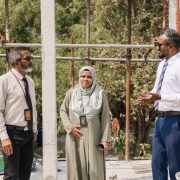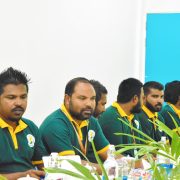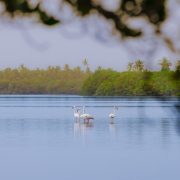“The journey to Male’ began on ‘Kaleyfaanube’s Fehendhoo Ba’theli’ a traditional, sturdy Dhow that carried passengers to the capital. My mother, my brothers—Ali and Mubarik— and I were boarded on the vessel. I was young, so were my brothers. Mubarik was not even a year old. Ali was around six years of age, and I was barely eight. My memories of the trip were foggy to say the least, and after scrapping it bare, I asked my mother to fill in for the missing pieces.
I remember my uncle and his wife joining us. Better known as “Dhuhloabe and Azitha”, the two were counting the days of their honeymoon, a few days after their intimate wedding. They were a happy couple and I always remembered them with blinding smiles.
The journey began smoothly but as time passed, the calm weather made it difficult for the sails to move steadily. Much to everyone’s dismay, the ‘Ba’theli’ made an abrupt stop at ‘Baraveli Kandu’. It was Ramadan, people were fasting and tired. Despite the shortcomings, we were able to row the vessel and make a pitstop at Lhaviyani Atoll Hinnavaru.
Fortunately, Fainu Ismailbe and Hawwa Dhaitha— close friends of my grand father— lived in Hinnavaru. They were extremely tender and compassionate. Interactions with the duo were always jovial. Till his death, Ismailbe and my family were close. We all had a soft spot for the kindred man with happy memories to remember him by.
Suffice to say, Ismailbe was over the moon seeing us in his homeland. He left no stones unturned to make us feel welcomed. He had urged us to extend our stay, to wait a while longer. Ismailbe and his family made us feel like we were home.
Despite the small family keeping us entertained, we knew we cannot stay any longer. It was Ramadan after all, and we had no intention of making them feel burdened by our stay. Ismailbe continued to find a boat that could take us back. He made it his every day routine to ask captains and seasoned travellers of a possible trip to the capital. We were content, as we were in good hands.
Luck however, was not on our side. The weather was too composed, not a single rebellious gust breaking its serene equanimity. Drained of hope, we knew it will not be an easy feat to travel in a sailboat. It will take a few days, they assured us.
Ismailbe once again came to our rescue with the news of an engine boat from H.Dh. Neykurendhoo making a stop at the island of Hinnavaru. He helped us secure a spot, telling my mother if she was up to it, she can travel with the kids to the capital faster. My uncle promised to take care of our belongings that were in the ‘Ba’theli’ and with that, we began our journey.
The balmy weather painted a picture of a tranquil afternoon sky. I saw the wide ocean spanning into miles, not a single speck of land in sight. It felt like the ‘dhoani’ was caressing the smoothness of the ocean, gentle waves moving fleetingly across the vessel. There was a small makeshift hut on the ‘dhoani’ made to provide shade to the passengers from the scorching sun. We were sitting comfortably, outside of the hut. The ‘dhoani’ moved across Kaashidhoo ocean in a comfortable speed. Despite the cloudless sky, we felt fresh, thanks to the crisp wind that blew on our faces with the ‘dhoani’s’ momentum.
This was when we had 2 piston Yanma engines in our vessels. Earlier, people traveled in sail boats. Then came the revolution that was the engine. Every boat had an engineer, someone who had the sole authority over the engine, that often lied in an enclosed space of the boat called the ‘engine house.’ The engineer has to go inside this space in order to slow down or speed up the workings of the engine.
Every now and then the engineer would grease the engine. If the ocean was rough, the man would most likely stay inside the ‘engine house’ during the entire journey. But since we traveled on a mellow day, the engine house was covered, save for the smaller top. My ears were ringing with the noise and I remember feeling the thrill in my veins.
Azitha, my uncle’s wife, took slow steps towards the front of the vessel that had a water container. Feeling the thirst, she made her way to it with a small cup tightly held on her right hand. She was a skinny woman in her adolescence, making it easier for her to manoeuvre her way towards the front. She would carefully hold a string here, or a stick there to balance her posture. This was when it happened, and I remembered this part so vividly. Azitha accidentally grabbed a string too thin to hold her strength, making it snap
immediately. We watcher in horror as she lost her balance and fell into the deep, dark ocean that felt and looked depthless to my naive eyes.
Screams filled the small dhoani. My mother immediately informed the engineer who made his way into the engine house. The dhoani was moving swiftly in its original direction and it took time to change its momentum. A man jumped with a small wooden board, trying to get a hold of Azitha. I was shaking with fear, holding on to my mother with everything in me.
By the time the dhoani made its turn and reached the spot, the man who jumped with the wooden board had gotten a hold of Azitha and we all let the breath we were holding. Turned out, Azitha had a string with her that was connected to the dhoani. Without it, she might have been lost to us. She was also good at swimming. Azitha looked unfazed, but once she settled on the boat and started pouring fresh water over her now salt drenched self, I saw her looking down in embarrassment.
Needless to say, that was definitely a highlight of my life I will never forget.”
Note: The original story is by Abdulla Saeed. The image attached with the article is a photograph by Frank Burnaby. It may not be the exact boat but the image holds close resemblance to the Ba’theli mentioned in the write up.












 in #Thiladhunmathi
in #Thiladhunmathi
Comments